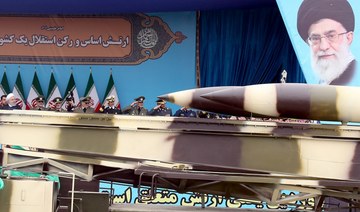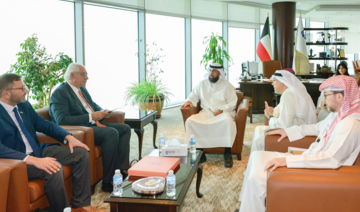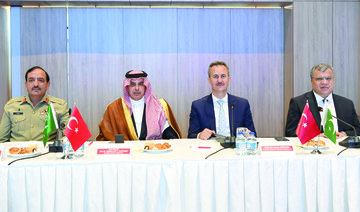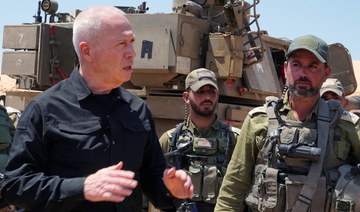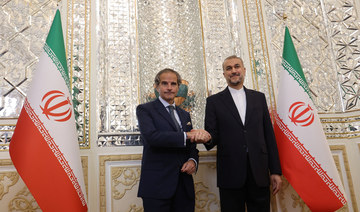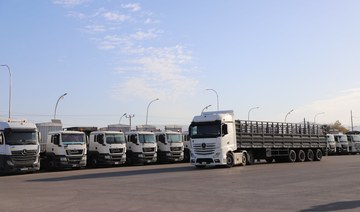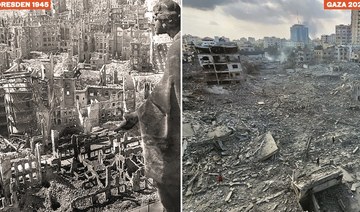DUBAI: Top officials in Iran say the upcoming US election doesn’t matter, but nearly everyone else there seems to be holding their breath.
The race for the White House could mean another four years of President Donald Trump’s “maximum pressure” campaign. Or it could bring Joe Biden, who has raised the possibility of the US returning to Iran’s 2015 nuclear deal with world powers.
In the upper levels of Iran’s Islamic republic, overseen by 81-year-old Supreme Leader Ayatollah Ali Khamenei, anti-Americanism is as deeply entrenched as at any time since the 1979 Islamic revolution, with presidents from both parties seen as equally repugnant.
“America has a deep-rooted enmity against the Iranian nation and whether Trump is elected or Biden, it will not have any impact on the US main policy to strike the Iranian nation,” parliament speaker Mohammad Bagher Qalibaf said in September, according to the semiofficial Fars news agency.
But noticeably, Khamenei himself hasn’t commented on the election, even as public interest has soared. State-run radio rebroadcast a BBC Farsi-language service simulcast of the presidential debates live — even as Iran continues to target journalists for the British broadcaster.
That interest allegedly includes Iran’s security apparatus as well. US officials accuse the Islamic republic of sending emails to voters seeking to intimidate them into voting for Trump. It may have been an attempt to link the president to apparent election interference in order to sow chaos, like Russia’s interference in America’s 2016 election. Tehran denies being involved.
The Iranian public is paying attention. The state-owned polling center ISPA said this month that 55 percent of people believe the outcome of the election will affect Iran “a lot.” Over half expected Trump would win, while a fifth said Biden. ISPA said it surveyed over 1,600 people by telephone, and did not provide a margin of error.
Trump’s reelection would mean the extension of his pressure campaign, including sanctions on Khamenei and other senior officials. Some of the sanctions are largely symbolic — Khamenei has only once traveled to America and does not hold any US bank accounts — but others have devastated the economy and sent the local currency into freefall. As a hedge, Iranians have poured money into foreign currency, real estate, precious metals and the stock market — which hit a record high in August.
Trump on the campaign trail has hit on that and his decision to launch a drone strike that killed a top Iranian general in January — a move that led Tehran to launch a retaliatory ballistic missile strike, wounding dozens of American troops.
To cheers, Trump has described the general, Qassem Soleimani, as “the world’s No. 1 terrorist,” likely due to him being blamed for the improvised explosive devices that maimed US troops in Iraq and for supporting Syria’s Bashar Assad. Many Iranians revered Solemani for fighting against Daesh and in the Iran-Iraq war in the 1980s, and millions flooded the streets for his funeral processions.
“The first call I get when we win will be from the head of Iran, let’s make a deal. Their economy is crashing,” Trump told a campaign rally in Allentown, Pennsylvania, on Monday. “They will call and I want them to do well, but they cannot have a nuclear weapon.”
Biden has left open the possibility of returning to the nuclear deal, in which Tehran agreed to limit its uranium enrichment in exchange for the lifting of economic sanctions. The other signatories — Britain, France, Germany, Russia and China — have remained committed to the agreement and allowed a UN arms embargo to expire as part of the deal, despite a White House push to keep it in place.
After Trump withdrew from the deal in 2018 and restored crippling sanctions, Iran began publicly abandoning the agreement’s limits on enrichment. It now has at least 2.32 tons of low-enriched uranium, according to a September report by the International Atomic Energy Agency (IAEA). Experts typically say 1.15 tons of low-enriched uranium is enough material to be re-enriched for one nuclear weapon.
Iran insists its nuclear program is peaceful and still allows IAEA inspectors to monitor its atomic sites. But experts say the “breakout time” needed for Iran to build one nuclear weapon if it chooses to do so has dropped from one year under the deal to as little as three months.
Iran in the past also has threatened to abandon a nuclear nonproliferation treaty or expel international inspectors. It recently began construction at an underground nuclear site, likely building a new centrifuge assembly plant after a reported sabotage attack there earlier this year.
“’America First’ has made America alone,” Biden said at a televised ABC town hall this month, playing on a longtime Trump slogan. “You have Iran closer to having enough nuclear material to build a bomb.”
What a return to the deal means, however, is in question. Biden’s campaign website says he would use “hard-nosed diplomacy and support from our allies to strengthen and extend it.” One criticism of the accord was its narrow focus on the nuclear program, despite concerns by the US, Israel and its Gulf Arab allies over Iran’s ballistic missile program and its presence in Iraq, Lebanon and Syria.
Iran maintains that its ballistic missile program is vital for deterring potential attacks and non-negotiable. It is also unlikely to cease its military activities in Syria and Iraq, where it spent considerable blood and treasure in the war against Daesh.
But ensuring the survival of the Islamic republic, particularly amid the coronavirus pandemic, may require the same flexibility that saw Iran agree to negotiations with the US in the first place. Iran will hold a presidential election in June, but any decision to re-engage with Washington would have to be made by the supreme leader.
“Khamenei’s revolutionary path actually leads to America — that is, by seeking a stable, safe, and meticulously measured relationship with the United States, he believes he can guarantee the survival of both the regime and its revolutionary content and orientation,” wrote Mehdi Khalaji, a Qom-trained Shiite theologian who is an analyst at the Washington Institute for Near East Policy.
“Tehran’s objective is therefore a scandalous paradox: Deal with America to remain anti-American.”
Iranians awaiting US election results with bated breath
https://arab.news/wwhtc
Iranians awaiting US election results with bated breath
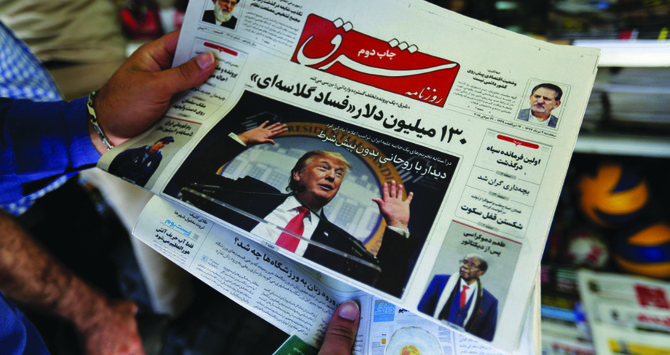
- Khamenei himself hasn’t commented on the election, even as public interest has soared
Kuwait, Turkiye sign agreements during emir’s state visit
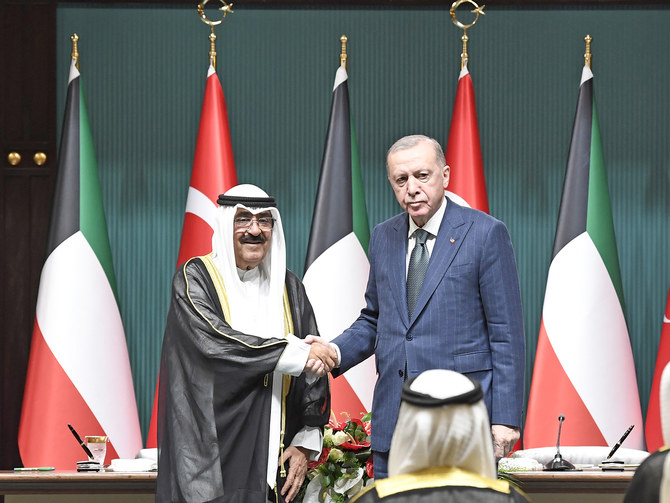
- Several cooperation deals inked at the Presidential Palace in Ankara
LONDON: Kuwait’s Emir Sheikh Meshal Al-Ahmed Al-Jaber Al-Sabah held talks on Tuesday with Turkish President Recep Tayyip Erdogan on a range of regional and international issues during his official visit to Ankara.
The two parties “expressed a common desire to bolster cooperation and coordination in many fields,” in particular trade and investment, and the emir said the two countries had the potential to boost trade exchange and investment opportunities, the Kuwait News Agency reported.
He went on to praise the “historic relations between our countries for the past 60 years, since their establishment in 1964,” and added “we express our aspirations toward promoting these relations to honor the aspirations of our peoples.”
Sheikh Meshal, who had arrived in the Turkish capital earlier on Tuesday, also praised Turkiye’s “honorable” support for Kuwait during Iraq’s invasion in 1990.
The Kuwaiti emir welcomed the start of negotiations for a free trade agreement between the GCC (Gulf Cooperation Council) and Turkiye, which commenced following the signing of a joint statement on April 21.
He added: “We affirm our aspiration for strengthening joint cooperation in all fields, especially in the defense domain through government-to-government contracting.”
The two leaders witnessed the signing of several cooperation agreements at the Presidential Palace in Ankara, including an executive protocol between the Kuwaiti and Turkish defense ministries.
The countries’ foreign ministries signed a memorandum of understanding to establish a strategic dialogue, while the Kuwaiti Civil Defense and the Turkish Ministry of Interior Disaster and Emergency Management Authority also signed a memorandum.
Letters of intent were signed between the Kuwait Direct Investment Promotion Authority and the Turkish General Authority for Free Zones in the Ministry of Trade on cooperation in the free zones field, and between the Kuwaiti Ministry of State for Housing Affairs and the Turkish Ministry of Environment, Urbanization and Climate Change on cooperation in housing and infrastructure.
The Kuwait Investment Authority and the Turkish Presidency Investment Office signed a memorandum regarding cooperation on investment promotion.
Erdogan awarded Sheikh Meshal with the State Order “to reflect deep-rooted ties between the two friendly countries,” KUNA said.
The emir also paid a visit to the Ataturk Mausoleum in Ankara during the visit.
Jordan’s Queen Rania highlights effects of war in Gaza on the world

- She tells Milken Institute Global Conference 2024 in Los Angeles the conflict has ‘divided people along new battle lines’ and fueled a growing sense polarization among peoples
- ‘The only way we can achieve security in our part of the world is through a negotiated peace, where Palestinians have not a promise of statehood, but actual statehood,’ she says
LONDON: Jordan’s Queen Rania on Tuesday discussed the global effects of Israel’s war on Gaza and called for a just solution to the wider Israeli-Palestinian conflict.
Speaking during a session at the Milken Institute Global Conference 2024 in Los Angeles on Monday, she said the war has “exposed old fractures” and “divided people along new battle lines,” which has contributed to a growing global polarization.
“Polarization leads to binary thinking; it makes us think of our world as us versus them, left versus right, East versus West,” she added. “And even though that might give us a false sense of security that we belong in a certain camp, it actually inadvertently really puts constraints on us because it kind of limits the way we think, what we should do, what we should say and, more importantly, it makes us look at everybody outside our camp as the rival, as the enemy.
“Peace cannot be achieved through violence … it has to be achieved through negotiations, political process, evenhandedness and commitment (and) the only way that we can achieve security in our part of the world is through a negotiated peace, where Palestinians have not a promise of statehood, but actual statehood.
“It all comes back down to an illegal occupation. You want safety and security, we need to end the occupation, because you cannot have a safe and secure Israel while there is a grave injustice on their border.”
Queen Rania highlighted the divisions and sense of “selective empathy” that exist in relation to the Israeli-Palestinian conflict and said people increasingly feel forced to choose sides, causing the “middle ground to shrink year after year.”
She told delegates: “When it comes to the Palestinians, I think they’ve been pushed to the periphery, where their suffering has become almost unnoticed, and where they become almost a people unto whom anything can happen without consequence.
“That’s why it’s important for us to actually find that middle ground. People should put people first. What Palestinians want is not sympathy or special treatment; they just want the impartial application of the law.”
Queen Rania also spoke about the number of civilian deaths during the war in Gaza, which began after the Oct. 7 attacks by Hamas on Israel, and noted that it has claimed the lives of more doctors, aid workers and journalists than any other conflict, as well as 14,500 children.
Regardless of whether Israel’s actions during the conflict can officially be categorized as genocide or not, many people are dying and the very fact that people are even discussing whether such a designation is justified was “shocking” enough in itself, she said.
The world expressed its collective anger over the Hamas attacks on Israel on Oct. 7, she added, so why, she asked, do the mass deaths in Gaza not warrant the same response?
“You have to give human life equal value and you have to place equal condemnation on human rights violations,” said the queen. “You cannot have credibility without moral consistency.”
The US has a very important role to play in the war because it is the single most powerful country in terms of its leverage on Israel, she said, and so much depends on how willing Washington is to use its “political capital” to hold Israeli authorities accountable for their actions.
“The starting point needs to be a legal framework that is recognized by the international community, and then a commitment from the US to hold Israel accountable when it doesn’t stick to the terms, of course,” said Queen Rania.
She added that there is a need for Israelis and Palestinians to “start to heal the wounds and to try to build the trust that has been lost now as a result of years of suffering, and we have a responsibility to try to stand behind a vision that delivers the people there the security and the future they deserve.”
The theme for the 27th annual Milken Institute Global Conference, which began on Sunday and concludes on Wednesday, is “Shaping a Shared Future.” Specific topics of discussion on the agenda include geopolitical hot spots, the climate crisis, and the rise of artificial intelligence.
UN atomic chief urges Iran to take ‘concrete’ steps for cooperation
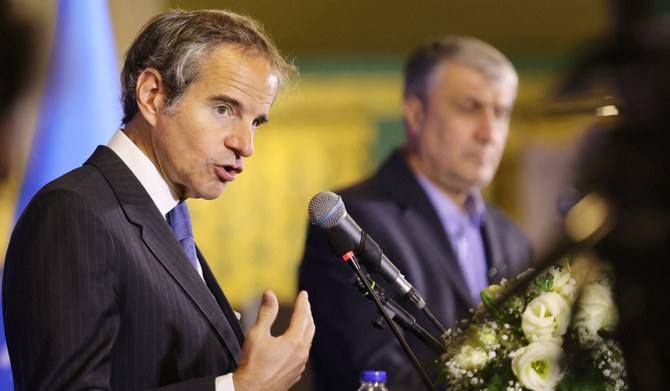
- Grossi said a March 2023 deal with Iran was “still valid” but required more “substance”
ISFAHAN: UN atomic watchdog chief Rafael Grossi, visiting Iran on Tuesday, urged the country to adopt “concrete” measures to bolster cooperation on its nuclear program and address the international community’s concerns.
At a news conference in the city of Isfahan, Grossi said he had proposed in talks with Iranian officials that they “focus on the very concrete, very practical and tangible measures that can be implemented in order to accelerate” cooperation.
The International Atomic Energy Agency director-general held talks with senior Iranian officials including Atomic Energy Organization’s head Mohammad Eslami.
Grossi insisted on the need to “settle differences” on the nuclear issue while the Middle East was going through “difficult times,” particularly with the war between Israel and the Iran-backed Palestinian militant group Hamas in the Gaza Strip.
“Sometimes, political conditions pose obstacles to full-fledged cooperation” between Iran and the international community, he said.
To overcome these obstacles, he said, “we need to come up with concrete steps that are going to be helpful in bringing us closer to these solutions that we all need.”
Grossi said a March 2023 deal with Iran was “still valid” but required more “substance.”
The agreement was reached during Grossi’s last visit to Iran and outlined basic cooperation measures including on safeguards and monitoring. The IAEA chief said, however, that there had been a “slowdown” in the agreement’s implementation including the number of inspections being reduced and the accreditation of a group of IAEA experts being withdrawn by Iran.
Iran suspended its compliance with caps on nuclear activities set by a landmark 2015 deal with major powers a year after the US in 2018 unilaterally withdrew from the agreement and reimposed sweeping sanctions.
“We have this legal right to reduce our commitments when the other parties do not adhere to their obligations,” Eslami said during the joint news conference.
Tensions between Iran and the IAEA have repeatedly flared since the deal fell apart, and EU-mediated efforts have so far failed both to bring Washington back on board and to get Tehran to again comply with the terms of the accord.
The agency has in recent months criticized Iran for a lack of cooperation on issues including the expansion of its nuclear work, the barring of inspectors and deactivating the agency’s monitoring devices at its nuclear facilities.
Why Israel’s military operation in Rafah will lead to ‘inevitable catastrophe’ in Gaza
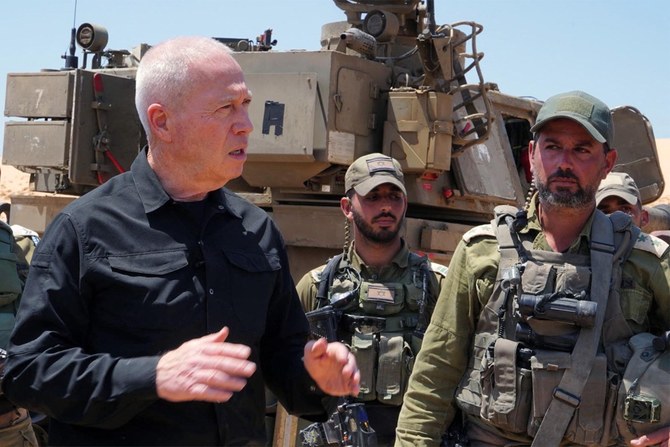
- Israel has seized control of the Rafah border crossing and ordered 100,000 Palestinians to “evacuate immediately”
- Full-scale assault on Rafah would intensify humanitarian emergency throughout Gaza, aid agencies warn
LONDON: Palestinians in Gaza’s southern governorate of Rafah face a desperate situation as the Israeli military proceeds with its long-planned assault on the area, capturing the Gaza side of the border crossing with Egypt and ordering displaced families to move yet again.
The Israeli army announced on Tuesday morning that its 401st Brigade had taken “operational control” of the Rafah border crossing after advancing into the eastern part during the night as part of its mission to dislodge Hamas.
Earlier on Monday, Israel ordered some 100,000 Palestinians in eastern Rafah to “evacuate immediately” to Al-Mawasi, a coastal town near Khan Younis that humanitarian organizations said was “completely uninhabitable.”
Mercy Corps said Palestinians in eastern Rafah were confronted with two impossible choices: Face death under bombardment or attempt a perilous journey to an unlivable area with no access to essential aid.

Bushra Khalidi, advocacy director for Oxfam in the Palestinian territories, says civilians fleeing Rafah have been left with nowhere to go.
She told Arab News that people in Rafah “are worried of even leaving their homes” because they fear they will not find anywhere in the middle area or in Al-Mawasi.
According to the AFP news agency, more than 74 percent of the infrastructure in Gaza has been destroyed since Oct. 7 when Israel launched its bombing campaign in retaliation for the Hamas-led attack on southern Israel.
Al-Mawasi, which Israel had dubbed a “humanitarian zone,” is “already overpopulated and filled with makeshift tents,” said Khalidi. “There is no infrastructure, there (are) no services, and no facilities to host this number of (internally displaced people).”
Moreover, this narrow coastal strip, measuring just 1 km wide and 14 km long, already hosts an estimated 250,000 displaced Gazans, according to the Palestinian Red Crescent.
Ahmed Bayram, media adviser for the Norwegian Refugee Council in the Middle East, stressed that “there is not a corner or a street in Gaza where people can go expecting safety.”
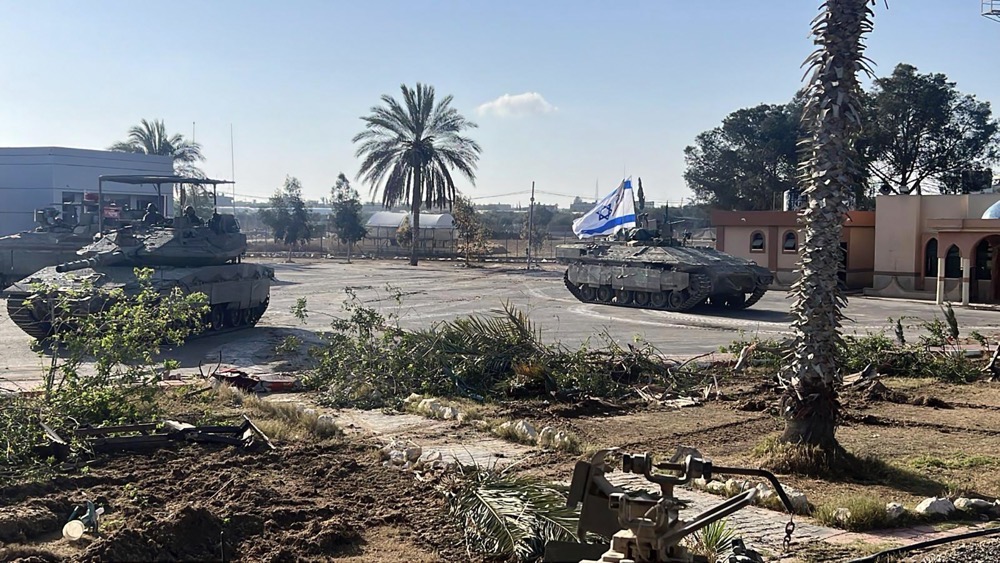
He told Arab News: “Al-Mawasi, which is one of the areas Israel has asked people to go to, is full to the very brim. There is no free spot left in that narrow stretch of land, which is not equipped for such high demand.”
According to Mercy Corps, Al-Mawasi is already a sea of makeshift tents, with little in the way of humanitarian relief, electricity, or water.
It also remains unclear whether Palestinians can flee to neighboring countries through the Rafah crossing now that it is under Israeli control, said Ruth James, Oxfam’s regional humanitarian coordinator for the Middle East and North Africa.
She told Arab News: “Many Palestinians in Gaza currently do not have the recognized right to return to their original homes. Given this context, Egypt, or any other state, should be cautious of inadvertently abetting any potential efforts by Israel, or any other party, to ethnically cleanse the Palestinian population of Gaza.”
Volker Turk, the UN human rights chief, slammed Israel’s evacuation order as “inhumane,” warning that such an action could amount to a war crime, Reuters reported.
Oxfam’s Khalidi also warned that if a Rafah-wide incursion happens, which is the worst-case scenario, it would “entail mass carnage and a complete bloodbath.”
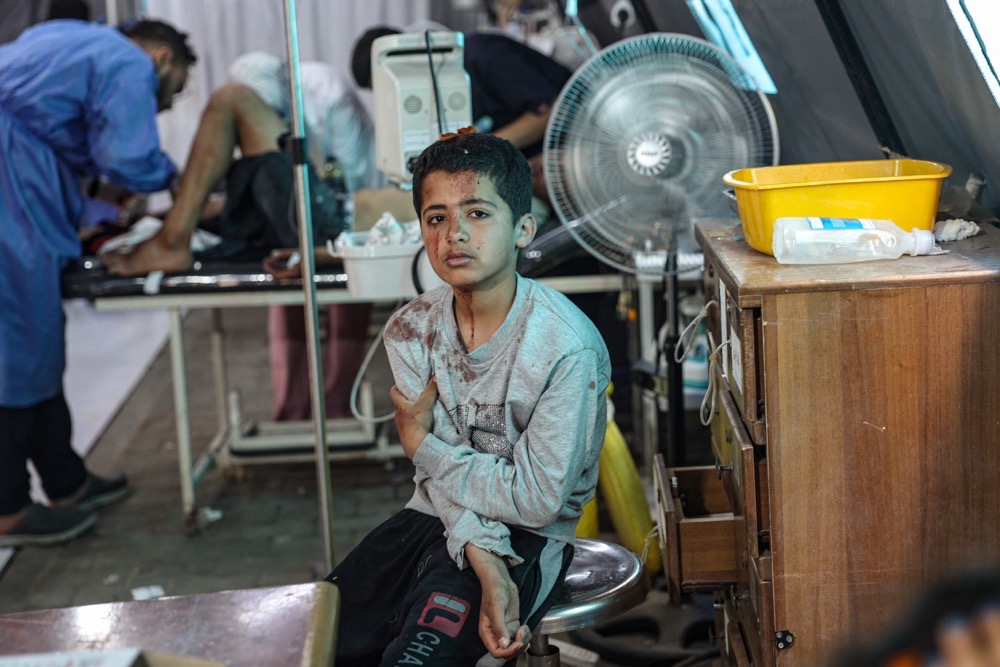
She explained that this is due to “how small” Rafah is and “because of how congested and overpopulated it is.”
Echoing her colleague’s fears, James said: “It’s hard to imagine the scale of need caused by a Rafah invasion. Simply put, this invasion can’t happen. There must be an immediate and permanent ceasefire.”
She added: “The alternative is an avoidable, massive loss of civilian life.”
Despite repeated public objections, even US President Joe Biden’s appeals against the Rafah offensive have gone unheeded.
According to the Associated Press, Biden urgently warned Israeli Prime Minister Benjamin Netanyahu in a phone call on Monday against invading Rafah, stressing it would only lead to more deaths and exacerbate the despair in the embattled enclave.
The Israeli military said its operation in Rafah is designed to eliminate fighters and dismantle infrastructure used by Hamas, according to Reuters.
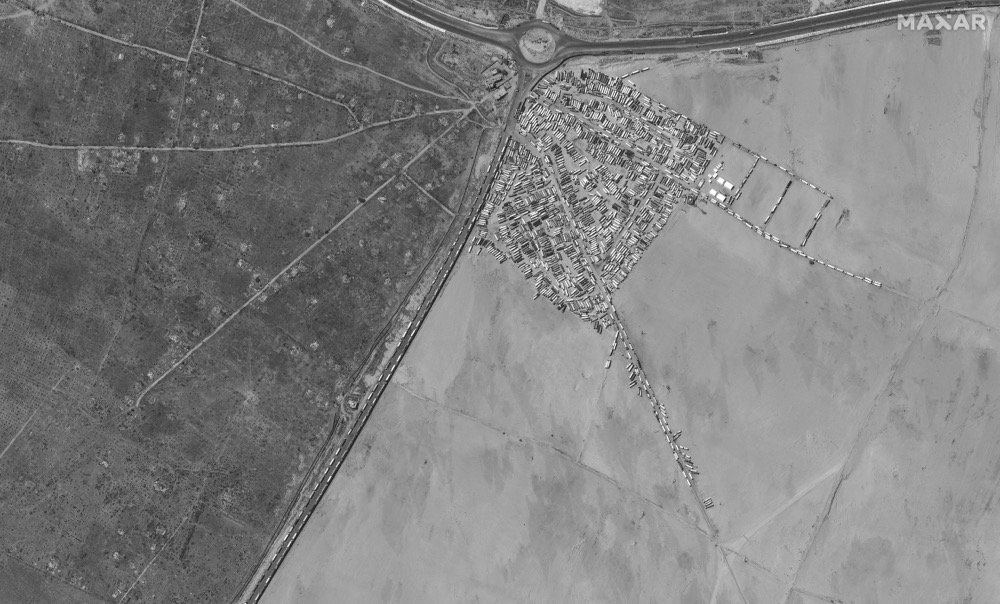
Israel’s overnight strikes across Rafah killed at least 23 people, including five children, according to local health officials.
Prior to that, Israeli warplanes pounded homes in Rafah, killing at least 27 Palestinians, including two babies, according to Gaza’s health authority.
This is despite Hamas accepting the terms of a Qatari-Egyptian ceasefire proposal on Monday.
Humanitarian organizations concur that the impact of Israel’s operation in Rafah will extend beyond the eastern area, affecting more than 1.4 million people who have been sheltering in the southern governorate — and the entirety of Gaza’s remaining population.
“While the initial ‘evacuation orders’ and operations announced in the east of Rafah are directly impacting 100,000 people, over 1.4 million are sheltering in Rafah, half of which are children, and are at direct risk of any escalated military operations across the area,” Salim Oweis, a spokesperson for UNICEF in Gaza, told Arab News.
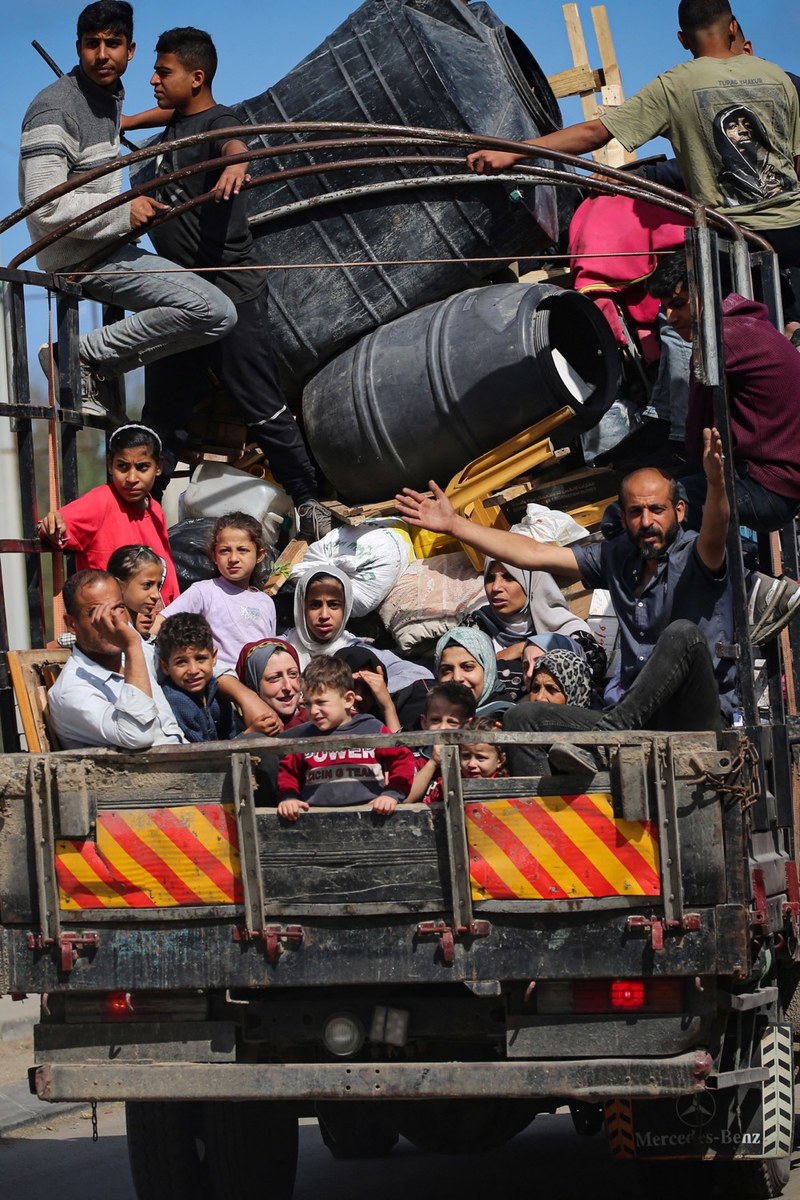
“The extended impact will be far-reaching to include all the 2.2 million residents of Gaza.”
Elaborating, Oweis added: “Rafah is the main hub of all humanitarian response, and any impact on the already struggling aid delivery and humanitarian response will hamper the efforts across Gaza.”
Rafah is the last population center in the Gaza Strip after the seven-month Israeli assault obliterated three-quarters of the besieged enclave, killing at least 34,700 Palestinians according to Gaza’s health ministry, and displacing 90 percent of the population of 2.3 million people.
Israel’s evacuation orders in eastern Rafah, coupled with unceasing airstrikes across Gaza’s south, have instilled panic among the war-weary residents, triggering an exodus of thousands of Palestinians who have nowhere to seek refuge.
Describing the situation across the Gaza Strip as “a state of despair, chaos and confusion” as Israel carries out its assault on Rafah, NRC’s Bayram said that “by issuing its orders, Israel has again pushed over 1 million people into the unknown.”
FASTFACTS
• Israel ordered Palestinians to evacuate to Al-Mawasi — deemed ‘completely uninhabitable.’
• Closing Rafah crossing would cut Gaza’s only viable humanitarian lifeline, warn aid chiefs.
• Fears that Rafah-wide incursion would ‘entail mass carnage and a complete bloodbath.’
He added: “Let’s not forget, while the orders cover an area with 100,000 people east of Rafah, the rest of the population in central and western areas will think they are next to be forcibly transferred, and so they will try to get out while they can.”
Tahani Mustafa, a senior Palestine analyst at the International Crisis Group, foresees a “horrific” humanitarian situation if the Rafah hostilities do not stop.
“All movement of people and goods has been closed off, at a time where famine is already in the north and was very much on the verge in the south,” she told Arab News.
“There’s been no contingency plan in place, and all foreign aid delegations have been evacuated. If this goes ahead as Israel states, it will be a massacre.”
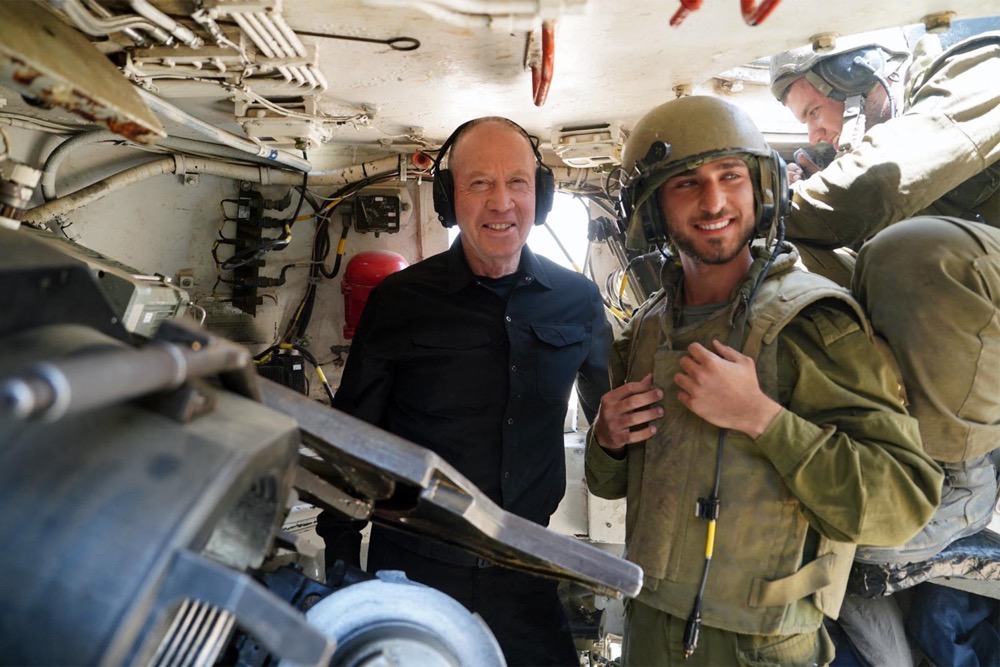
As Israel has blocked aid through the Rafah border crossing, aid groups are concerned about the impact on much-needed humanitarian assistance across the Gaza Strip. This concern is exacerbated by the suspension of aid deliveries to Gaza through the Kerem Shalom crossing following a nearby Hamas rocket attack.
Oxfam’s James cautioned that “even one day of closure (of crossing points) means that additional lives are likely to be lost to hunger and illness.”
She called on Israel to “adhere to its obligations under international humanitarian law to ensure civilian populations are provided with the most essential aid in sufficient quantities.”
Khalidi pointed out that aid organizations “are already facing huge obstructions” in delivering aid across Gaza.
Opinion
This section contains relevant reference points, placed in (Opinion field)
“Often aid is not making it even past Khan Younis,” she said. “And hence the descent to hell, into starvation, that we have seen over the last course of months in the north, but also across the strip.”
Stressing the need to open “all crossings” to meet the immense and deep humanitarian needs in Gaza, Khalidi said: “We’re hearing that maybe other crossings will open, but the problem is that we already had two crossings open, and that was not enough.”

The World Food Programme warned on Saturday that northern Gaza is experiencing a “full-blown famine,” which is “moving its way south.”
Bayram of the NRC also warned that “the entire aid system is at the point of collapse.”
He said: “Closing down the Rafah crossing means cutting off the only viable lifeline currently available for aid workers,” highlighting that the NRC relies on the Rafah crossing to bring in essential aid.
“Fuel is running low already and the existing stocks will not be able to sustain increasing demand,” he added, stressing that “Israel must reverse its plans so we can avoid an inevitable catastrophe.”
UNICEF’s Oweis emphasized that “any interruption to the already limited aid access will have a devastating impact on the humanitarian situation as a whole.”
He added: “With no fuel coming in, all the basic services will be in jeopardy of a total halt, including aid delivery and what’s left of healthcare.
“Not having food entering the strip means that more children will fall into malnutrition and disease, and will be put at heightened risk of death.”

Gaza’s health authority reported on April 25 that since February, at least 28 children, most of them no older than 12 months, had died of malnutrition and dehydration.
Oweis stressed that “the only hope for a way out of a worsening humanitarian catastrophe is simple, and it’s an immediate and long-lasting humanitarian ceasefire.”
He added: “Meanwhile, safe and consistent access for humanitarian organizations and personnel to reach children and their families with lifesaving aid, wherever they are in the Gaza Strip, is crucial.”

Israel’s incursion into Rafah putting 1.5m people in danger: WHO director
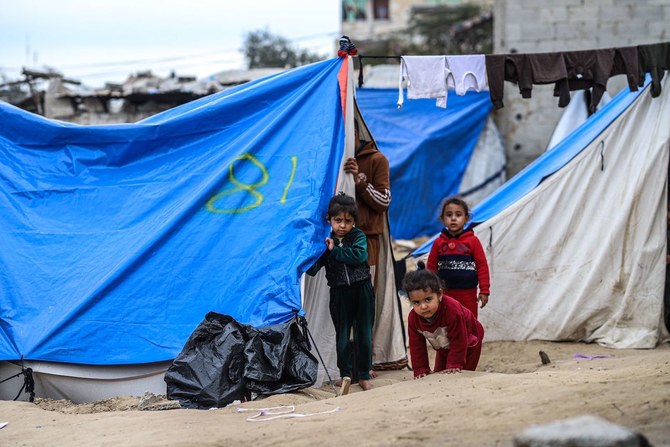
- Hospitals in Rafah must be protected and provided with the supplies they need to keep providing care to the thousands of sick and injured civilians, Balkhy said
LONDON: Israel’s military incursion into the Gazan city of Rafah is putting 1.5 million people, including 600,000 children, in “grave danger,” a World Health Organization official warned on Tuesday.
Dr. Hanan Balkhy, regional director for the Eastern Mediterranean, said on X that lives were hanging in the balance as the health system in the Gaza Strip struggled to remain functional.
The WHO and its partners were committed to providing assistance and delivering aid to all areas of the Gaza Strip, she said, but that required unimpeded access through the Rafah border crossing.
She called for the urgent reopening of the crossing and said any further escalation would push an already fragile humanitarian operation “to a breaking point.”
Hospitals in Rafah must be protected and provided with the supplies they need to keep providing care to the thousands of sick and injured civilians who were the victims of Israeli military operations, Balkhy said.
She called on the international community to pressure Israel to stop its military operation, which is threatening the lives of hundreds of thousands of Palestinian civilians in Rafah.
“An urgent ceasefire in Gaza is needed now, for humanity’s sake,” she said.
Israeli forces seized the main border crossing between Egypt and southern Gaza on Tuesday, shutting down a vital aid route into the Palestinian enclave that was already on the brink of famine.



